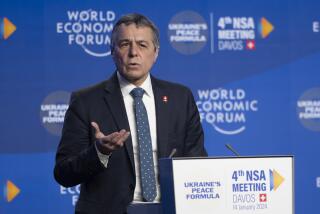Gains Seen as European Security Talks Recess : Delegates Call Issues Less Diffuse, Say Accord Can Be Concluded Within a Year
- Share via
STOCKHOLM — The 35-nation conference on European security recessed for the summer Friday, with delegates expressing optimism that a new East-West agreement on military confidence-building measures is emerging and can be concluded within a year.
“From the perspective of a few months ago, the issues are less diffuse, the range of our debate more precisely defined, our vocabulary increasingly similar,” James E. Goodby, head of the U.S. delegation, told the final session.
Curt Lidgard of the Swedish delegation, who is chairman of a group of nine neutral and nonaligned governments represented here, said the big change over the last few months has been that “we are all now generally talking in the same direction instead of against each other.”
Echoing this view, Leif Mevik of Norway told the conference: “The transition we have witnessed--from a rather high level of polemics on the part of some delegations into a generally businesslike atmosphere--is progress of its own kind. We have gradually moved into a rather concrete and detailed exchange of views on most of the issues before us. That, to my mind, is progress, and on several substantive questions there are now proposals and documents which help clarify positions further.”
Down to Business
The conference is still in the debate stage, but neutral and Western delegates both said they expect to begin getting down to negotiating the text of an agreement soon after they return to work in September. The French have proposed a deadline of July, 1986, for reaching agreement.
“If there is going to be any East-West agreement in the coming year it will be in Stockholm and not Geneva,” one delegate remarked.
At the same time, however, the scheduled November summit meeting in Geneva between President Reagan and Soviet leader Mikhail S. Gorbachev is regarded here as crucial to progress in Stockholm, as well as in the U.S.-Soviet negotiations on nuclear arms also taking place in Geneva.
The hope here is that whatever the difficulties over nuclear arms, Reagan and Gorbachev will agree to push for an early conclusion of the far simpler problems of confidence-building and security being discussed in Stockholm.
Missile Protest
This would include a new and binding commitment by the 35 governments that signed the 1975 Helsinki Agreements on Security and Cooperation in Europe to provide notice of all military exercises, to exchange general information at the start of each year on the organization and location of military forces, to invite observers to military exercises, to give notice of any major troop movements out of established base areas, and to provide means of verifying compliance with such agreements.
When this conference began in January, under terms of an agreement reached in early 1983 at the conclusion of a European security review conference in Madrid, the Soviets had already broken off the Geneva talks with the United States to protest the deployment of new missiles in Europe. They had also suspended discussions in Vienna between the North Atlantic Treaty Organization and the Warsaw Pact on a reduction of conventional forces. Throughout 1984, nothing was accomplished here in Stockholm, either.
But with the resumption of the Geneva arms talks in March, the pace began to pick up in Stockholm. Agreement was reached to substitute working groups for full debates. It is hoped that when the delegates return in September, the working groups will become drafting groups so that real negotiations can get under way.
In speeches and in the few papers offered by the East Bloc countries, the Soviet Union has aimed to limit the scope of confidence-building measures over land forces but extend them over NATO sea power, and at the same time extract a formal treaty on the non-use of military force and no-first-use of nuclear weapons.
No one here expects the negotiations to be easy, but for the first time agreement seems to be possible.
More to Read
Sign up for Essential California
The most important California stories and recommendations in your inbox every morning.
You may occasionally receive promotional content from the Los Angeles Times.












